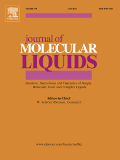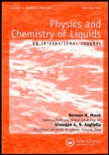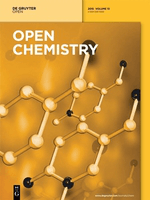
JOURNAL OF MOLECULAR LIQUIDS
Scope & Guideline
Unveiling the Complexities of Liquid Molecules
Introduction
Aims and Scopes
- Molecular Interactions and Dynamics:
The journal prioritizes research that investigates the fundamental molecular dynamics and interactions in liquid systems, including solvent-solute interactions, hydrogen bonding, and the effects of various temperatures and pressures. - Thermodynamic Properties and Phase Behavior:
Studies on the thermodynamic properties of liquids, including solubility, vapor-liquid equilibria, and phase transitions, are central to the journal's scope, contributing to the understanding of liquid behavior in different environments. - Nanotechnology and Advanced Materials:
Research focusing on the synthesis and application of nanomaterials, particularly in enhancing the properties of liquids and their interactions, is a vital aspect of the journal's contributions. - Ionic Liquids and Deep Eutectic Solvents:
The journal features investigations into ionic liquids and deep eutectic solvents, exploring their roles in various chemical processes, including extraction, catalysis, and their environmental impacts. - Sustainable and Green Chemistry:
Research that promotes sustainable practices, including the use of renewable resources in solvent systems and environmentally friendly extraction methods, is emphasized to address contemporary chemical challenges.
Trending and Emerging
- Deep Eutectic Solvents:
Research into deep eutectic solvents is expanding, highlighting their versatility in extraction processes, catalysis, and as green alternatives to traditional solvents. - Nanomaterials and Their Applications:
There is a growing trend in exploring the synthesis and application of nanomaterials within liquid systems, focusing on their enhanced properties for environmental remediation, catalysis, and drug delivery. - Machine Learning in Solubility Prediction:
The integration of machine learning techniques for predicting solubility and other thermodynamic properties is on the rise, demonstrating the journal's commitment to modern computational methods. - Biomolecular Interactions and Drug Delivery Systems:
Research focusing on the interactions between biomolecules and solvents, particularly in the context of drug delivery systems and biocompatibility, is gaining traction. - Sustainable Practices in Chemical Research:
There is an increasing emphasis on sustainability, with studies aimed at reducing environmental impact through innovative solvent systems and green chemistry practices.
Declining or Waning
- Traditional Organic Solvents:
There is a noticeable decline in studies centered around conventional organic solvents as researchers increasingly adopt greener alternatives like ionic liquids and deep eutectic solvents. - Single Solvent Systems:
Research focusing solely on single solvent systems is waning as the trend shifts toward studying mixed solvent systems that better mimic real-world applications and interactions. - Classical Thermodynamics without Computational Validation:
The reliance on classical thermodynamic approaches without accompanying computational studies appears to be diminishing, as the integration of computational methods becomes standard practice in liquid characterization.
Similar Journals

DOKLADY PHYSICAL CHEMISTRY
Catalyzing Scientific Dialogue in Theoretical ChemistryDOKLADY PHYSICAL CHEMISTRY is a prominent peer-reviewed journal published by MAIK NAUKA/INTERPERIODICA/SPRINGER, focusing on advancements and research in the field of Physical and Theoretical Chemistry. With the ISSN 0012-5016 and E-ISSN 1608-3121, this journal serves as a vital platform for researchers and practitioners to disseminate their findings and insights from 1996 to the present. Despite its current Q4 ranking in the 2023 category of Physical and Theoretical Chemistry, the journal has shown significant potential for visibility and engagement within the academic community, ranking #149 out of 189 in its respective field according to Scopus metrics, highlighting its dedicated readership. While the journal is not open access, it remains an essential resource for those seeking in-depth research articles, reviews, and commentary within this dynamic discipline. As the field continues to evolve, DOKLADY PHYSICAL CHEMISTRY plays a crucial role in fostering scientific dialogue and collaboration among researchers, professionals, and students worldwide.

PHYSICS AND CHEMISTRY OF LIQUIDS
Exploring the Depths of Liquid InteractionsPHYSICS AND CHEMISTRY OF LIQUIDS is a distinguished academic journal dedicated to the exploration and advancement of liquid-state scientific research within the fields of physics and chemistry. Published by Taylor & Francis Ltd, this esteemed journal features contributions that delve into various aspects of condensed matter physics, materials chemistry, and characteristics of electronic, optical, and magnetic materials. With an ISSN of 0031-9104 and an E-ISSN of 1029-0451, it has been disseminating valuable knowledge since its inception in 1968. The journal’s commitment to academic rigor is reflected in its current Q3 rankings across multiple categories, including condensed matter physics and physical chemistry. Although not open access, the journal remains a crucial resource for researchers, professionals, and students seeking to stay at the forefront of liquid research advancements. Its publications contribute significantly to the understanding of the interactions and behaviors of liquid materials, making it an indispensable asset in both academic and industrial contexts.

Acta Crystallographica Section B-Structural Science Crystal Engineering and Materials
Driving excellence in structural science and engineering solutions.Acta Crystallographica Section B: Structural Science, Crystal Engineering and Materials, published by the International Union of Crystallography, stands as a pivotal resource for researchers and professionals in the fields of materials science, crystal engineering, and structural biology. With an e-ISSN of 2052-5206, this journal is recognized for its contributions to advancing knowledge on the structural aspects of materials, drawing significant interest from the Q2 category in several disciplines, including Atomic and Molecular Physics and Materials Chemistry. As the field evolves through innovative research approaches and methodologies, the journal actively covers developments within the scope of materials synthesis, characterization, and application in various sectors including medicine and electronics. Though not an open-access journal, it is entangled in the scientific discourse, ensuring that key studies are accessible to academic institutions and professionals globally. With a commitment to excellence, its impact across multiple quartile rankings signifies its influence and importance for scholars eager to contribute to cutting-edge research.

JOURNAL OF CHEMICAL CRYSTALLOGRAPHY
Unlocking the secrets of chemical crystallography since 1994.Welcome to the Journal of Chemical Crystallography, a prominent publication dedicated to the advancement of knowledge in the fields of chemical crystallography, general chemistry, and condensed matter physics. Published by Springer/Plenum Publishers, this journal provides a critical platform for researchers, professionals, and students to disseminate and access innovative research findings and methodologies from 1994 to 2024. With an ISSN of 1074-1542 and E-ISSN 1572-8854, the journal currently holds a Q4 quartile ranking in both Chemistry and Condensed Matter Physics, reflecting its broadening scope and niche significance within the scientific community. While it operates under a traditional access model, it endeavors to promote high-quality research that advances theoretical and practical aspects of crystallography, making it an essential resource for those involved in these dynamic disciplines. Join us as we explore the intricate world of chemical structures and their properties, bridging gaps between chemistry and physics.

Open Chemistry
Catalyzing Progress in Chemistry and Materials ScienceOpen Chemistry, published by DE GRUYTER POLAND SP Z O O, is a distinguished peer-reviewed journal that has been serving the global chemistry community since its inception. With an ISSN of 2391-5420 and an E-ISSN also of 2391-5420, this open-access journal has been accessible to researchers and practitioners alike since 2015, ensuring a wide dissemination of high-quality research findings. Located in Germany, specifically at BOGUMILA ZUGA 32A STR, 01-811 WARSAW, MAZOVIA, POLAND, Open Chemistry aims to publish innovative research across various chemical disciplines, with special attention to miscellaneous chemistry and materials chemistry. It is currently ranked in the Q3 category for both fields as of 2023, reflecting its solid standing within the academic community, with specific ranks of 187/408 in General Chemistry and 153/317 in Materials Chemistry, corresponding to respective percentiles of 54 and 51. Open Chemistry not only enhances the accessibility of cutting-edge research but also serves as a vital resource for students, professionals, and scholars seeking to advance their knowledge in the rapidly evolving landscape of chemical sciences.

RUSSIAN JOURNAL OF INORGANIC CHEMISTRY
Advancing Knowledge in Inorganic ScienceThe Russian Journal of Inorganic Chemistry is a distinguished publication that delves into the fundamental and applied aspects of inorganic chemistry. Published by MAIK Nauka/Interperiodica/Springer, this journal has established itself as a vital resource for researchers, professionals, and students alike, contributing significantly to the fields of Inorganic Chemistry, Materials Science, and Physical and Theoretical Chemistry. With an ISSN of 0036-0236 and an E-ISSN of 1531-8613, the journal is indexed for easy access and citation. Though the journal currently operates under a subscription model, its commitment to disseminating high-quality research and fostering scientific discourse remains steadfast. The journal has been maintaining a consistent record since its inception, and its positioning in the Q3 quartile across various chemistry categories in 2023 underscores its relevance in the academic community. As it continues through its converged years from 1996 to 2024, the Russian Journal of Inorganic Chemistry plays a pivotal role in enhancing the understanding and advancement of inorganic chemistry, making it an indispensable tool for anyone engaged in this dynamic field.

Moroccan Journal of Chemistry
Innovating Chemistry Research Through Open Access Excellence.Moroccan Journal of Chemistry, published by the University Mohammed Premier Oujda, serves as a pivotal platform for researchers and professionals in the field of chemistry, particularly focusing on diverse and emerging areas within the discipline. Established in 2018, this open-access journal facilitates widespread dissemination of scholarly articles, ensuring that cutting-edge research reaches a global audience. With an ISSN of 2351-812X and categorized in the Q3 quartile for miscellaneous chemistry in 2023, the journal maintains rigorous peer-review standards while fostering an inclusive environment for scientific dialogue. Located in Morocco, it aims to bridge local and international research communities, contributing to the advancement of knowledge in chemistry. As it continues to grow, the Moroccan Journal of Chemistry remains an essential resource for students, educators, and professionals eager to stay abreast of the latest developments in the field.

JOURNAL OF MOLECULAR MODELING
Connecting Researchers in the World of Molecular ScienceJOURNAL OF MOLECULAR MODELING, published by Springer, is a pivotal resource for researchers and professionals in the fields of chemistry, computer science, and molecular sciences. The journal's ISSN is 1610-2940, with an E-ISSN of 0948-5023, reflecting its commitment to disseminating cutting-edge research from 1996 to 2024. Although the journal does not operate under an Open Access model, it remains an invaluable platform for the publication of innovative studies related to computational methods, theoretical chemistry, and molecular simulations. With a notable categorization across multiple quartiles—including Q4 in Catalysis and Q3 in Computational Theory and Mathematics—the journal holds a distinct rank in Scopus, highlighting its influence and contribution to the discipline. The importance of this journal lies in its ability to bridge the gap between theoretical understanding and practical applications, making it essential reading for students and scholars seeking to advance their knowledge and research in molecular modeling.

Chemical Physics Reviews
Exploring the Nexus of Chemistry and PhysicsChemical Physics Reviews is a premier academic journal published by AIP Publishing, focusing on the dynamic interplay between chemistry and physics. With its E-ISSN: 2688-4070, the journal is committed to advancing the field through high-quality reviews that address key challenges, emerging trends, and innovative applications in chemical physics. Although currently not open access, it offers valuable insights for both researchers and practitioners seeking to deepen their understanding of theoretical and experimental aspects of chemical interactions. The journal serves as a vital resource for professionals and students alike, ensuring they stay abreast of the latest developments in this interdisciplinary field. As a part of AIP Publishing’s esteemed catalogue, Chemical Physics Reviews plays an essential role in shaping the discourse and fostering collaboration within the global scientific community.

Physical Chemistry Research
Exploring the depths of fluid dynamics and theoretical insights.Physical Chemistry Research, published by the Iranian Chemical Society, is an esteemed academic journal dedicated to advancing knowledge within the fields of *Fluid Flow and Transfer Processes*, *Physical and Theoretical Chemistry*, and *Statistical and Nonlinear Physics*. Since its inception in 2013, the journal has established a crucial platform for researchers, professionals, and students to share innovative findings and methodologies, enhancing collaboration and knowledge dissemination in the physical chemistry community. With impactful contributions recognized in Quartile 3 and Quartile 4 classifications across various categories, the journal is positioned to cultivate emerging research trends as it continues to converge through 2024. Researchers can benefit from diverse perspectives on crucial phenomena in physical chemistry, as the journal is indexed in prominent databases, further increasing accessibility and visibility. The *open access* policy ensures that cutting-edge research remains available to a broad audience, promoting the growth of the discipline globally.